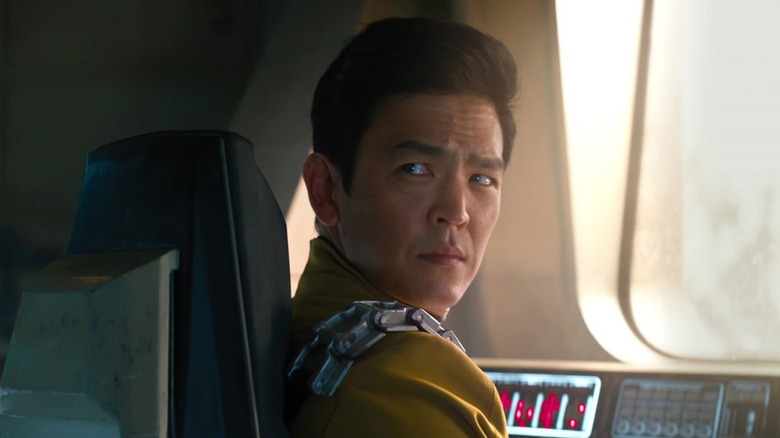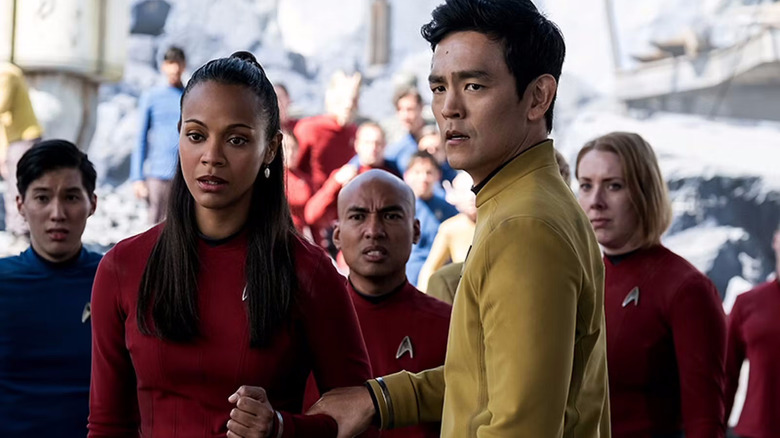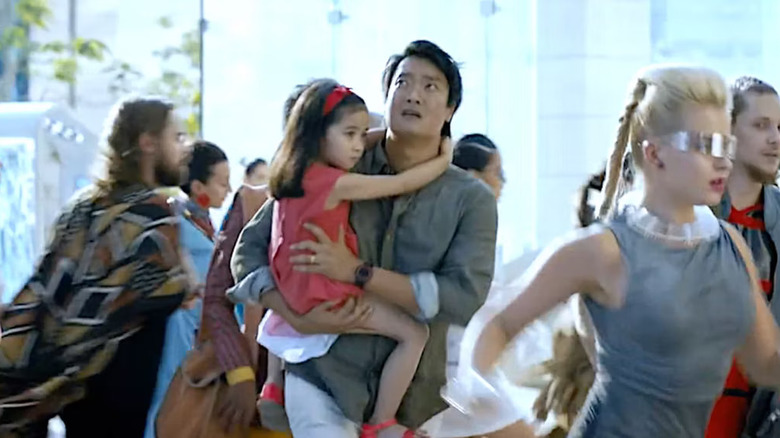A Deleted Scene In Star Trek Beyond Would Have Revealed A Devastating Sulu Detail
In 2005, actor George Takei, speaking to Frontiers magazine, described his coming out process, noting that revealing his sexuality had to be, at that late date, a political act. Speaking anecdotally, many Trekkies had known for years that Takei was gay, even though he had never had a public coming out moment. After announcing himself, Takei became an outspoken queer rights activist, speaking at public events and spreading queer news online. Sometimes his activism was even fun and cheeky; for a while, one could go to Takei's website and order rainbow t-shirts that read "THAT'S SO TAKEI."
Takei didn't appear in Justin Lin's 2016 film "Star Trek Beyond," as actor John Cho had taken over his 1966 role of Hikaru Sulu with the release of J.J. Abrams' "Star Trek" in 2009. Wanting to pay homage to Takei, however, the makers of "Star Trek Beyond" revealed that Sulu was raising a young daughter with his husband, Ben (Doug Jung). Sulu's sexuality hadn't been mentioned in the Klevin-verse, so giving him a husband did not alter continuity. Takei reportedly didn't like that Sulu was made gay, saying that Gene Roddenberry created Sulu as a heterosexual character and that Takei played the role as a heterosexual character. Sulu's sexuality in "Beyond" is hardly an issue, however, as he is only seen with Ben in a very brief, dialogue-free scene. If you were in the bathroom, you'd miss it.
Ben, however, originally played a larger (albeit offscreen) role in "Beyond" in an earlier cut of the film. Speaking to TrekMovie in 2016, Cho revealed that Sulu had a few lines of dialogue explaining how Ben came to be living on Starfleet's massive Yorktown station ... and that it wasn't the rosiest story. It seems there was some marital dissonance between Sulu and Ben.
Ben, the two of us need look no more
At the beginning of "Star Trek Beyond," the U.S.S. Enterprise is returning from an extended space mission, eager to rest and get back to their families. The crew's time off is to be spent at Yorktown, a massive space complex constructed of multiple giant rings. Sulu lives in Yorktown with Ben and his daughter Demora (a character introduced as an adult in 1994's "Star Trek: Generations"). Later in the film, a vengeance-mad villain named Krall (Idris Elba), armed with futuristic super-weapons, puts Yorktown in danger. There is a brief shot of Ben and Demora running for their lives.
That shot, it seems, was meant to carry with it a lot more emotional heft. Cho talked about a scene wherein Ben was said to have moved to Yorktown against his will. Cho described it thus:
"There was a scene that is not in the film but was written which is very revealing, where Sulu makes a confession to Uhura and says that his husband didn't want to move out to Yorktown, which is this remote outpost, but he made that sacrifice for Sulu's career. Sulu felt a very heavy sense of guilt about having made that move and now had inadvertently endangered his family, and then Uhura comforts him. You know, that was a color that wouldn't have come out if we hadn't been paired off, and I thought that was cool."
Cho's reference to being "paired off" alludes to the structure of "Beyond," which sees the U.S.S. Enterprise destroyed over an alien world, and the crew scattered. Each plot line follows a different pair of characters. Sulu is paired with Uhura (Zoe Saldaña).
Ben's view
Speaking to CBR in 2016, actor Doug Jung — who was also the film's co-screenwriter — had nothing but nice things to say about working on "Star Trek Beyond." He did a lot of research with his co-screenwriter Simon Pegg and director Justin Lin, and they had a lot of conversations as to the utopian ideals of "Star Trek." He also revealed that he hadn't given his canonical acting role in the massive "Star Trek" franchise enough thought. Now that he had been established as the spouse of one of Trek's main characters, Jung was suddenly confronted with the notion that Ben Sulu would now be spread throughout the franchise's expanded universe. Jung said:
"You know what? I never even thought of it that way! Now I'm terrified! No, whenever people ask, it wasn't by design like I ended up doing that. Because of just really the situation: we were shooting in Dubai, and the actor who was going to play that role ended up dropping out two days before. So they asked me if I'd do it. It was really, really great to do."
As for worrying about the alteration of a character's sexuality, Jung said it was all in the spirit of "Star Trek" and that he didn't concern himself with fan reactions, adding:
"I actually never thought of the reaction, fan reaction, or anything. I was more afraid of missing on some other things like, 'Spock would never say that!' 'That's actually counter to something that's referenced in 'The Corbomite Maneuver."' So maybe it's, again, that firm belief that the foundation of that universe supports these ideas and the people who are fans of it, of course are going to accept it."
Trekkies accepted it.


